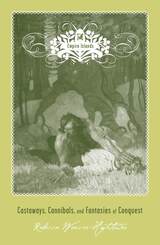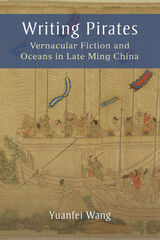4 books about Pirates in literature

Empire Islands
Castaways, Cannibals, and Fantasies of Conquest
Rebecca Weaver-Hightower
University of Minnesota Press, 2007
Through a detailed unpacking of the castaway genre’s appeal in English literature, Empire Islands forwards our understanding of the sociopsychology of British Empire. Rebecca Weaver-Hightower argues convincingly that by helping generations of readers to make sense of—and perhaps feel better about—imperial aggression, the castaway story in effect enabled the expansion and maintenance of European empire.Empire Islands asks why so many colonial authors chose islands as the setting for their stories of imperial adventure and why so many postcolonial writers “write back” to those island castaway narratives. Drawing on insightful readings of works from Thomas More’s Utopia to Caribbean novels like George Lamming’s Water with Berries, from canonical works such as Robinson Crusoe and The Tempest to the lesser-known A Narrative of the Life and Astonishing Adventures of John Daniel by Ralph Morris, Weaver-Hightower examines themes of cannibalism, piracy, monstrosity, imperial aggression, and the concept of going native. Ending with analysis of contemporary film and the role of the United States in global neoimperialism, Weaver-Hightower exposes how island narratives continue not only to describe but to justify colonialism.Rebecca Weaver-Hightower is assistant professor of English and postcolonial studies at the University of North Dakota.
[more]

Enemies of All Humankind
Fictions of Legitimate Violence
Sonja Schillings
Dartmouth College Press, 2016
Hostis humani generis, meaning “enemy of humankind,” is the legal basis by which Western societies have defined such criminals as pirates, torturers, or terrorists as beyond the pale of civilization. Sonja Schillings argues that the legal fiction designating certain persons or classes of persons as enemies of all humankind does more than characterize them as inherently hostile: it supplies a narrative basis for legitimating violence in the name of the state. The book draws attention to a century-old narrative pattern that not only underlies the legal category of enemies of the people, but more generally informs interpretations of imperial expansion, protest against structural oppression, and the transformation of institutions as “legitimate” interventions on behalf of civilized society. Schillings traces the Anglo-American interpretive history of the concept, which she sees as crucial to understanding US history, in particular with regard to the frontier, race relations, and the war on terror.
[more]

Pirate Novels
Fictions of Nation Building in Spanish America
Nina Gerassi-Navarro
Duke University Press, 1999
In Pirate Novels Nina Gerassi-Navarro examines an overlooked genre to reveal how history and fiction blend to address important isuses of nation building in nineteenth-century Spanish America. In the figure of the pirate, bold and heroic to some, cruel and criminal to others, she reveals an almost ideal character that came to embody the spirit of emerging nationhood and the violence associated with the struggle to attain it.
Beginning with an overview of the history of piracy, Gerassi-Navarro traces the historical icon of the pirate through colonial-era chronicles before exploring a group of nineteenth-century Mexican, Colombian, and Argentine novels. She argues that the authors of these novels, in their reconstructions of the past, were less interested in accurate representations than in using their narratives to discuss the future of their own countries. In reading these pirate narratives as metaphors for the process of nation building in Spanish America, Gerassi-Navarro exposes the conflicting strains of a complex culture attempting to shape that future. She shows how these pirate stories reflect the on-going debates that marked the consolidation of nationhood, as well as the extent to which the narratives of national identity in Spanish America are structured in relation to European cultures, and the ways in which questions of race and gender were addressed.
Providing new readings of the cultural and political paradigms that marked the literary production of nineteenth-century Spanish America, Pirate Novels uniquely expands the range of texts usually examined in the study of nation-building. It will interest literary scholars generally as well as those engaged in Latin American, colonial, and postcolonial studies.
Beginning with an overview of the history of piracy, Gerassi-Navarro traces the historical icon of the pirate through colonial-era chronicles before exploring a group of nineteenth-century Mexican, Colombian, and Argentine novels. She argues that the authors of these novels, in their reconstructions of the past, were less interested in accurate representations than in using their narratives to discuss the future of their own countries. In reading these pirate narratives as metaphors for the process of nation building in Spanish America, Gerassi-Navarro exposes the conflicting strains of a complex culture attempting to shape that future. She shows how these pirate stories reflect the on-going debates that marked the consolidation of nationhood, as well as the extent to which the narratives of national identity in Spanish America are structured in relation to European cultures, and the ways in which questions of race and gender were addressed.
Providing new readings of the cultural and political paradigms that marked the literary production of nineteenth-century Spanish America, Pirate Novels uniquely expands the range of texts usually examined in the study of nation-building. It will interest literary scholars generally as well as those engaged in Latin American, colonial, and postcolonial studies.
[more]

Writing Pirates
Vernacular Fiction and Oceans in Late Ming China
Yuanfei Wang
University of Michigan Press, 2021
In Writing Pirates, Yuanfei Wang connects Chinese literary production to emerging discourses of pirates and the sea. In the late Ming dynasty, so-called “Japanese pirates” raided southeast coastal China. Hideyoshi invaded Korea. Europeans sailed for overseas territories, and Chinese maritime merchants and emigrants founded diaspora communities in Southeast Asia. Travel writings, histories, and fiction of the period jointly narrate pirates and China’s Orient in maritime Asia. Wang shows that the late Ming discourses of pirates and the sea were fluid, ambivalent, and dialogical; they simultaneously entailed imperialistic and personal narratives of the “other”: foreigners, renegades, migrants, and marginalized authors. At the center of the discourses, early modern concepts of empire, race, and authenticity were intensively negotiated. Connecting late Ming literature to the global maritime world, Writing Pirates expands current discussions of Chinese diaspora and debates on Sinophone language and identity.
[more]
READERS
Browse our collection.
PUBLISHERS
See BiblioVault's publisher services.
STUDENT SERVICES
Files for college accessibility offices.
UChicago Accessibility Resources
home | accessibility | search | about | contact us
BiblioVault ® 2001 - 2024
The University of Chicago Press









